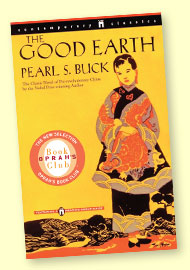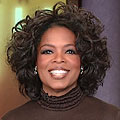Oprah's E-mails
9/15 Oprah Announces a New Book!

We're traveling from Russia to China...and back in time! Our fall selection is The Good Earth by Pearl S. Buck—the first American woman to win the Nobel Prize for Literature.
The Good Earth is a beautifully written novel that follows one family's dreams and nightmares across a changing Chinese landscape. And, Oprah says, "It's also juicy as all get out!"
Pick up your copy of The Good Earth and start reading today!
Our Quick Guide for Anna Karenina was such a success, we put together another bookmark for The Good Earth—and this one has a map!
Log in to print your Quick Guide today!
Who's Reading with Oprah?
Watch fellow Book Clubbers' video diaries and see who crossed the Anna finish line with Oprah. Plus, find out how Oprah's Book Club is putting books in the hands of children around the world.
Get the highlights from the Oprah's Book Club show!
The Good Earth is a beautifully written novel that follows one family's dreams and nightmares across a changing Chinese landscape. And, Oprah says, "It's also juicy as all get out!"
Pick up your copy of The Good Earth and start reading today!
Our Quick Guide for Anna Karenina was such a success, we put together another bookmark for The Good Earth—and this one has a map!
Log in to print your Quick Guide today!
Who's Reading with Oprah?
Watch fellow Book Clubbers' video diaries and see who crossed the Anna finish line with Oprah. Plus, find out how Oprah's Book Club is putting books in the hands of children around the world.
Get the highlights from the Oprah's Book Club show!
- What's on your "must read with Oprah" list?
- Our literary guide is ready to answer your questions about The Good Earth. Ask your question today!
- Find out how an American came to write a book about China. Meet Pearl S. Buck.

Hello my book club friends!
Now we delve into yet another time and place with the beautiful, wistful words of The Good Earth. I told you it would be easy...isn't it? Reading Pearl Buck's writing feels like reading poetry to me. I just love the quiet rhythm of the words. They evoke the simple beauty of the characters and the harsh mystery of China's ancient culture.
"Moving together in a perfect rhythm, without a word, hour after hour, he fell into a union with her which took the pain from his labor. He had no articulate thought of anything; there was only the perfect sympathy of movement, of turning this earth of theirs over and over to the sun, this earth which formed their home and fed their bodies and made their gods." (p. 29–30)
There is a connection to something larger—to the earth, to history and heritage—that forms a powerful force throughout the novel. Despite cruel gods, bad omens, greedy relatives, marauding neighbors, corrupt landowners...despite starvation and deprivation—Wang Lung and O-lan cling to their humble strength and profound attachments to larger unspoken elements of life. It is this attachment that gets them through.
Pearl Buck's China is a severe culture where women, even beloved wives and daughters, are called slaves and considered bad luck. But even the women who seem to silently accept their position in society have their moments of quiet defiance. It is O-lan's strength, determination and resourcefulness that sustain the family, not Wang Lung's silver.
When Wang Lung struggles with indecision and becomes disheartened, O-lan is stoic and prepared to make any sacrifice—even to take her own newborn daughter's life. "He was about to say, 'But I heard it crying—alive—' and then he looked at the woman's face. ... After all, during these months he had had only his own body to drag about. What agony of starvation this woman had endured, with the starved creature gnawing at her from within, desperate for its own life!" (p. 82)
Now we delve into yet another time and place with the beautiful, wistful words of The Good Earth. I told you it would be easy...isn't it? Reading Pearl Buck's writing feels like reading poetry to me. I just love the quiet rhythm of the words. They evoke the simple beauty of the characters and the harsh mystery of China's ancient culture.
"Moving together in a perfect rhythm, without a word, hour after hour, he fell into a union with her which took the pain from his labor. He had no articulate thought of anything; there was only the perfect sympathy of movement, of turning this earth of theirs over and over to the sun, this earth which formed their home and fed their bodies and made their gods." (p. 29–30)
There is a connection to something larger—to the earth, to history and heritage—that forms a powerful force throughout the novel. Despite cruel gods, bad omens, greedy relatives, marauding neighbors, corrupt landowners...despite starvation and deprivation—Wang Lung and O-lan cling to their humble strength and profound attachments to larger unspoken elements of life. It is this attachment that gets them through.
Pearl Buck's China is a severe culture where women, even beloved wives and daughters, are called slaves and considered bad luck. But even the women who seem to silently accept their position in society have their moments of quiet defiance. It is O-lan's strength, determination and resourcefulness that sustain the family, not Wang Lung's silver.
When Wang Lung struggles with indecision and becomes disheartened, O-lan is stoic and prepared to make any sacrifice—even to take her own newborn daughter's life. "He was about to say, 'But I heard it crying—alive—' and then he looked at the woman's face. ... After all, during these months he had had only his own body to drag about. What agony of starvation this woman had endured, with the starved creature gnawing at her from within, desperate for its own life!" (p. 82)
I find myself searching for O-lan's name on the pages to see how she is salvaging the pieces of Wang Lung's crumbling fate. Wang Lung is a fish out of water in the big city of Nanking, but O-lan takes charge, relying on her childhood as a beggar to put food in the family's bellies. It's fascinating to me how many great books have women as the true heroine!
What shape will the lives of O-lan and Wang Lung take? Will they return to the land they love? Keep reading.
— Oprah
Ask Oprah
We're asking our members: If you could ask Oprah anything about The Good Earth, her book club or reading in general, what would it be? Don't be shy!
Log on and ask your question here.
What's On Your "Must Read" List?
What have you always wanted to read with Oprah's Book Club? Make your reading suggestions known! You never know where or when they might show up!
Your Guide to Part One Is Here
You've just finished Part One! See how well you remember the trials and tribulations of Wang Lung and his young family. Don't think of it as a test, it's more like a game! Plus, 10 new discussion questions, a plot point, a character journey and what's coming up!
Go to Your Guide now.
What shape will the lives of O-lan and Wang Lung take? Will they return to the land they love? Keep reading.
— Oprah
Ask Oprah
We're asking our members: If you could ask Oprah anything about The Good Earth, her book club or reading in general, what would it be? Don't be shy!
Log on and ask your question here.
What's On Your "Must Read" List?
What have you always wanted to read with Oprah's Book Club? Make your reading suggestions known! You never know where or when they might show up!
Your Guide to Part One Is Here
You've just finished Part One! See how well you remember the trials and tribulations of Wang Lung and his young family. Don't think of it as a test, it's more like a game! Plus, 10 new discussion questions, a plot point, a character journey and what's coming up!
Go to Your Guide now.
- If you're stumped by symbolism or curious about culture, e-mail our literary guide.
- Who's your favorite character? Log in and join the worldwide discussion!
- Glimpse the heart of the woman behind The Good Earth.
- Do you have your "members only" bookmark? Print yours today.

Hello book lovers!
Like the land itself, Pearl S. Buck's beautiful language rises and falls with so many layers and nuances in The Good Earth! It's a simple book, but deep and rich, don't you think? If you're reading along with our Book Club calendar, you've just traveled through the heart of the novel. You've seen the dark side and the redemption of the land and the man, Wang Lung. And you've felt, no doubt, the wisdom and poignant nobility of the woman, O-lan.
If you're a woman reading this, you've probably felt what I often feel when reading historical genres. Can you imagine being born in pre-revolutionary China—only 100 years ago—and automatically being considered worthless? Weren't we born at the right time?!
It's ironic, but no surprise to me, that O-lan's instincts and experience—even the very jewels she retrieves from the great house in the city—are what ultimately make Wang Lung the rich landowner he becomes. In O-lan I feel such an abiding, humble dignity. The real jewels O-lan offers to Wang Lung are her enduring faithfulness, her insight, her strength. She is forever honest and true, much like the land that Wang Lung belongs to.
Weren't you disappointed when Wang Lung strayed from the earth and from his wife? I knew no good could come of it...the karma for that had to catch up with him later. As a matter of fact, I think he is a heel for taking in the whore Lotus, even though it's the culturally acceptable thing to do.
Do you find it interesting how even today, when a spouse decides to fool around, they go through much of the "makeover process" Wang Lung went through—cutting off his traditional hair, getting new clothes, avoiding garlic and bathing with soap every day. The absolute nerve!
I was so disappointed and angry with him for asking O-lan to give back the two precious pearls she'd kept between her breasts—pearls she wanted to keep for the day when their youngest daughter might wed. But, in his lovesick rage, Wang Lung even turns against his daughter. "Why should that one wear pearls with her skin as black as earth? Pearls are for fair women!" (p.186) O-lan dutifully hands the jewels over and continues her laundry, not stopping to wipe her tears away.
Like the land itself, Pearl S. Buck's beautiful language rises and falls with so many layers and nuances in The Good Earth! It's a simple book, but deep and rich, don't you think? If you're reading along with our Book Club calendar, you've just traveled through the heart of the novel. You've seen the dark side and the redemption of the land and the man, Wang Lung. And you've felt, no doubt, the wisdom and poignant nobility of the woman, O-lan.
If you're a woman reading this, you've probably felt what I often feel when reading historical genres. Can you imagine being born in pre-revolutionary China—only 100 years ago—and automatically being considered worthless? Weren't we born at the right time?!
It's ironic, but no surprise to me, that O-lan's instincts and experience—even the very jewels she retrieves from the great house in the city—are what ultimately make Wang Lung the rich landowner he becomes. In O-lan I feel such an abiding, humble dignity. The real jewels O-lan offers to Wang Lung are her enduring faithfulness, her insight, her strength. She is forever honest and true, much like the land that Wang Lung belongs to.
Weren't you disappointed when Wang Lung strayed from the earth and from his wife? I knew no good could come of it...the karma for that had to catch up with him later. As a matter of fact, I think he is a heel for taking in the whore Lotus, even though it's the culturally acceptable thing to do.
Do you find it interesting how even today, when a spouse decides to fool around, they go through much of the "makeover process" Wang Lung went through—cutting off his traditional hair, getting new clothes, avoiding garlic and bathing with soap every day. The absolute nerve!
I was so disappointed and angry with him for asking O-lan to give back the two precious pearls she'd kept between her breasts—pearls she wanted to keep for the day when their youngest daughter might wed. But, in his lovesick rage, Wang Lung even turns against his daughter. "Why should that one wear pearls with her skin as black as earth? Pearls are for fair women!" (p.186) O-lan dutifully hands the jewels over and continues her laundry, not stopping to wipe her tears away.
Wang Lung continues to stray from what is truest, and moves Lotus and her servant into a new wing of his house. Still, O-lan remains the hero of the story, for me. She sets her limits. She continues making meals for Wang Lung's father and taking care of the family but refuses to serve Cuckoo, who was cruel to her when they were both slaves in the House of Hwang. When Wang Lung tries to force O-lan to serve Lotus and Cuckoo, she has a defining moment. She stands up for herself and says to Wang Lung, "I am not a slave of slaves in this house at least." (p. 203) Her truth is simple and unshakeable.
Finally, the flood that has taken Wang Lung away from farming recedes...and the land calls him back. He throws off his new clothes and velvet shoes, grabs a hoe and runs out to the fields. Working heals his lovesickness and Lotus loses her hold over him. He starts eating simple meals at O-lan's table. It seems that balance has been restored. But I know that Wang Lung's karmic debt must be due soon....
What do you think?
— Oprah
Finally, the flood that has taken Wang Lung away from farming recedes...and the land calls him back. He throws off his new clothes and velvet shoes, grabs a hoe and runs out to the fields. Working heals his lovesickness and Lotus loses her hold over him. He starts eating simple meals at O-lan's table. It seems that balance has been restored. But I know that Wang Lung's karmic debt must be due soon....
What do you think?
— Oprah

Dear Book Club readers,
As we wrap up this sweeping tale of China, I say once again—I love this book! For me, The Good Earth did what real literature is supposed to do—it opened me up. I was fascinated by the culture, the struggle, the moment in time that Pearl Buck has created.
I was so moved by O-lan's deep abiding love...by the tragedy of her life as a woman slave in China. Yet even in her tragedy, O-lan is a pure force of good—and, ironically, good luck.
In fact, once Wang Lung lets go of O-lan, it's as if his world falls apart. I knew that would happen, didn't you—karma come to roost. As Wang Lung becomes a wealthy landowner, ever more drawn to the "modern" symbols of money and power—a second, even a third "wife," a great house, sons who don't work the land—his luck seems to fail him. It's no coincidence, I believe, that Wang Lung's farms are destroyed by a flood of unparalleled proportions, that his home is occupied by the revolutionary army, that he is held hostage by an ungrateful and bitter cousin. Without O-lan's influence, even Wang Lung's own sons create war within the family and within Wang Lung's heart.
And what does he yearn for most? Peace. The kind of peace he had at his poorest, simplest time, when it was just Wang Lung and O-lan, in silent harmony, working the land.
Without O-lan, Wang Lung's love for the land doesn't sustain him. His life and his relationships are all empty. He has become a modern man and raised modern sons who have no love for him or his land. In his old age, Wang Lung is lonelier, further disconnected and regretful of the past. Does he know, as his life comes to its close, that O-lan was the closest thing to a partner he ever had?
Even if Wang Lung realizes the mistakes he's made, he's powerless to change them. Is it fate, the will of unmerciful, vengeful gods he has wrestled with through the whole novel, or his own doing? I believe Wang Lung's journey contains a powerful message for us all: If you sacrifice people and love to strive for riches outside yourself, in the end, all you have is a handful of earth.
The richness of the earth...of life...comes from love.
— Oprah
As we wrap up this sweeping tale of China, I say once again—I love this book! For me, The Good Earth did what real literature is supposed to do—it opened me up. I was fascinated by the culture, the struggle, the moment in time that Pearl Buck has created.
I was so moved by O-lan's deep abiding love...by the tragedy of her life as a woman slave in China. Yet even in her tragedy, O-lan is a pure force of good—and, ironically, good luck.
In fact, once Wang Lung lets go of O-lan, it's as if his world falls apart. I knew that would happen, didn't you—karma come to roost. As Wang Lung becomes a wealthy landowner, ever more drawn to the "modern" symbols of money and power—a second, even a third "wife," a great house, sons who don't work the land—his luck seems to fail him. It's no coincidence, I believe, that Wang Lung's farms are destroyed by a flood of unparalleled proportions, that his home is occupied by the revolutionary army, that he is held hostage by an ungrateful and bitter cousin. Without O-lan's influence, even Wang Lung's own sons create war within the family and within Wang Lung's heart.
And what does he yearn for most? Peace. The kind of peace he had at his poorest, simplest time, when it was just Wang Lung and O-lan, in silent harmony, working the land.
Without O-lan, Wang Lung's love for the land doesn't sustain him. His life and his relationships are all empty. He has become a modern man and raised modern sons who have no love for him or his land. In his old age, Wang Lung is lonelier, further disconnected and regretful of the past. Does he know, as his life comes to its close, that O-lan was the closest thing to a partner he ever had?
Even if Wang Lung realizes the mistakes he's made, he's powerless to change them. Is it fate, the will of unmerciful, vengeful gods he has wrestled with through the whole novel, or his own doing? I believe Wang Lung's journey contains a powerful message for us all: If you sacrifice people and love to strive for riches outside yourself, in the end, all you have is a handful of earth.
The richness of the earth...of life...comes from love.
— Oprah



